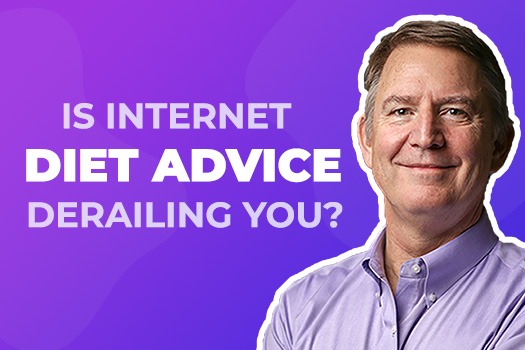Are you distracted by diet information on the internet?
The internet can be confusing
I work at Duke University. I’ve been there since 1990, studying low-carb keto diets since 1998. I find that a lot of people come to me with the darndest questions. Many of these questions come from things they’ve heard on the internet. The internet is a great thing and it’s a terrible thing all at the same time. I joke with my patients that you want to watch my information on the internet and ignore everyone else’s! But, essentially, you want to find a trusted source of information. The information I give has been vetted through years of not only research but also clinical care. I really try to keep giving information that will work and be helpful and scientifically supported. The internet can be very confusing.
Do your research and trust your decision
I recently was in the market for a new car. I don’t buy cars very often, so I like to read magazine evaluations, I’ll read Consumer Reports online and printed, I want to know if the make of the car has been around for a while, etc. When I make the purchase of a car after I do all my research, I will drive it for years. I don’t overly obsess about different amenities. This is the way I want you to think about diets, too. To continue the metaphor, you shouldn’t drive past car shops and get distracted, thinking you should buy this or that – you’ve made your decision. When you do your research and due diligence about a diet, great. You need to know where it came from, who’s talking about it, what’s their reputation, and is it somebody who has been around for a while?
The low-carb diet is not just a trending diet
I was reading a magazine article about Jacques Cousteau and the “aqualung,” or the scuba tank. The person writing the story said that the design is so simple that it never fails or only rarely fails. The writer mentioned that it’s like the doorknob: there’s no new doorknob; the concept stays the same. It works and it lasts for years. That’s the low-carb diet. It’s not a fad diet. It’s been in the Western world and has been used for weight loss for over 150 years. The low-carb diet is also very similar to the hunter-gatherer or Paleo/primal ways of looking at what to eat. When I see something new – a new diet or a new method – I think to myself, “Do we really need another doorknob? No, we don’t.” That’s just my style and my approach. Do your due diligence about the program that you’re going to do or the teacher that you’re learning from and then stick with it. Don’t be distracted.
Tune out the distractions
What I have seen in my patients quite frequently is now that they get the idea that this is a keto or low-carb diet, they start looking on the internet. There are going to be people who are against it forever. There are going to be people who say it’s bad for you and all that, because we were all taught that. Those who haven’t kept up with the science aren’t going to know that actually there’s a lot of research that backs the low-carb diet as a healthy way of eating. Don’t get distracted. If you’re learning from me, follow the approach I teach you. Follow my guidelines. Yes, it might be like driving on the left-hand side of the road if you’re used to driving on the right-hand, and vice versa. It might seem different and there is this innate or subconscious fear of going across the midline and eating fats. It might feel strange at the beginning, like getting in the new car feels different, but just drive it for a while. Follow the diet for a while and stay with it. Tune out these distractions.
If you choose to do a vegetarian diet or a vegan diet and that’s satisfying what you’re trying to accomplish, for example, stick with it for a while. It could be that after six months or a year you’ve achieved your goal and you want to change the type of eating pattern, great. Just be sure you vet it all again. Like buying a new car, see what the background is, if there’s any research behind it. People can say anything about diet; there’s no FDA regulation like there is with drugs, where drug companies cannot market that their product reverses diabetes unless they’ve shown the FDA that it does. There’s no requirement that teaching a certain diet be vetted or approved or allowed to be marketed for the FDA. You might even see nutritional supplements that say, “This has not been evaluated by the FDA,” or “We make no claims,” yet they’re still selling it and using language like it might sort of help to lose weight or it might sort of help to fix diabetes. My point is that just like getting a new car, test it. You might even use your friend’s recommendation or your relative’s recommendation, but make sure it’s a solid recommendation.
There’s a lot of word of mouth transfer of the keto low-carb diet. In fact, we call it a grassroots movement because the powers that be at the top are not promoting it, so you have to spread it by word of mouth in the grassroots way. Once you follow the diet and get used to it, like getting used to a new car, enjoy it. Don’t be distracted by the other types of information and diets out there. We’ve set up the Adapt Your Life YouTube channel for information about our approach, all for free for public access. I hope it’s helpful to you.
Check out the full video here.
